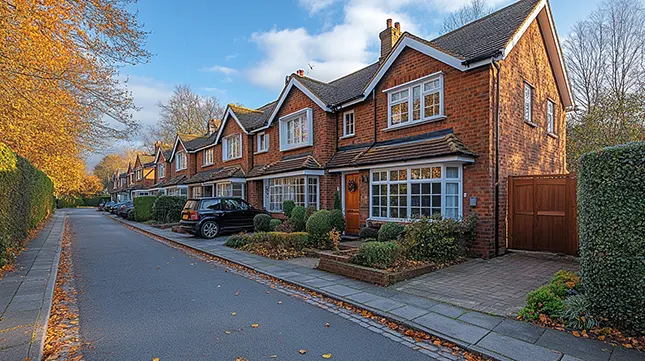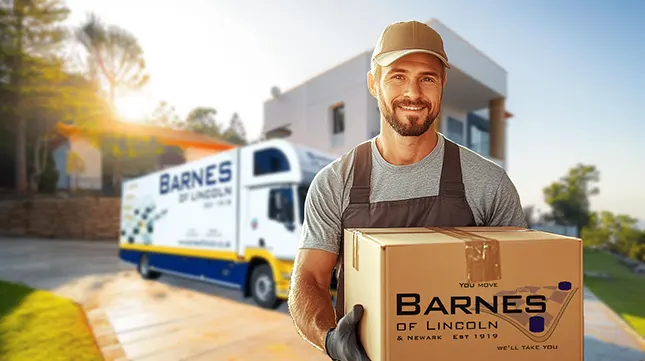Are you thinking of moving to the UK from USA?
Whether you crossed the Atlantic for a job, a fresh adventure, or family ties, returning home can stir up a surprising mix of excitement, nerves, and nostalgia.
The UK you’re heading back to might look slightly different from the one you left.
Since Brexit, the social, political, and economic landscape has shifted, and many returning expats find that home feels familiar and refreshingly new.
Your reasons for moving back could be deeply personal, a desire to be closer to family, support ageing parents, or enjoy a healthier work-life balance. Or perhaps you’re bringing back valuable career experiences gained stateside, ready for a new chapter.
Whatever your motivation, Barnes of Lincoln is here to help your move run as smoothly as possible.
This guide will cover everything you need to know, from visa advice and housing options to healthcare, finances, and practical tips for settling in.
Let’s explore how you can make your return journey to the UK successful.
The Pull of Home – Why Moving Back to the UK Makes Sense

Life in the United States can be vibrant and rewarding, but after a while, the comforts of home often come calling.
Returning to the UK brings a wealth of benefits, many of which only become clearer after time spent abroad.
One of the major draws is the NHS. For British citizens used to navigating America’s expensive healthcare system, free access to medical services (and heavily subsidised prescriptions) is a massive relief.
The education system is another plus. Families find good quality schooling, a strong network of public and grammar schools, and university tuition fees far lower than those in the US.
There’s also the simple joy of reconnecting with British culture: Sunday roasts, witty humour, football matches, historic towns, and cosy pubs all add to the charm.
And for travel lovers, Europe is practically on your doorstep which is so easy to explore with low-cost flights and a reliable rail network at your fingertips.
Of course, being closer to friends and family is most often at the top of the list.
Many of your family members may not have met your children.
Rebuilding relationships, sharing milestones, and offering support to loved ones can make the return truly worthwhile.
Remember, however, you are returning from a life-changing experience.
Perhaps you have changed too?
It’s not always as simple as picking up where you left off.
In your absence, friends may have moved on or even moved away, but coming home provides new opportunities both with work and friendships.
Give yourself time to re-adjust, and you will get back into the swing of things in no time.
Visas, Residency and Paperwork – Getting Your Return Right

If you’re a British citizen, moving back to the UK is usually a straightforward process.
However, if you’re returning with a spouse, partner, or children who aren’t British nationals, you’ll need to navigate the UK’s visa and immigration system carefully.
The most common route is the Family Visa, which allows eligible partners and dependents to live in the UK for up to 2.5 years initially, with the possibility of extension and eventual settlement.
To qualify, you’ll need to prove the relationship is genuine and meet a minimum income threshold which is currently £29,000 (as of 2025) for sponsoring a spouse.
If your partner plans to work, it might be better to apply for a Skilled Worker Visa instead. This visa requires a job offer from a licensed UK employer and meeting specific salary and skill level criteria.
Bringing children? If they were born overseas, check if they’re entitled to British citizenship by descent. Many children of British citizens qualify automatically but confirming this early can save time later.
It’s wise to gather documents such as marriage certificates, birth certificates, and proof of cohabitation before applying.
All things visa related are available on the official UK Government website. It pays to check that everything is in place and the correct visas have been granted.
Budgeting for the Big Move – What to Expect Financially

Returning home can be an emotional journey as well as a costly one if you’re not adequately prepared.
Many returning expats are surprised by how quickly expenses mount up, from shipping belongings to setting up a new home.
Start by factoring in the cost of your move itself.
International removals typically cost between £ 3,000 and £10,000, depending on the volume you’re shipping and how far you are from the port.
At Barnes of Lincoln, we offer tailored overseas removal services and work closely with trusted US partners to ensure your move is as seamless and cost-effective as possible.
Housing costs are another major consideration.
Rents and property prices have climbed sharply in many UK cities, particularly London, Bristol, and Edinburgh.
Add on council tax, utility bills, and agency fees if you’re renting, or legal fees and stamp duty if you’re buying.
Don’t overlook your US financial obligations either. The IRS still expects tax returns from American citizens abroad, so a dual-qualified tax adviser can help you stay compliant on both sides of the Atlantic.
Finally, when transferring large sums from dollars to pounds, using a foreign exchange specialist such as Halo Financial can help you secure the best rates.
For further financial planning, MoneyHelper offers free advice designed to guide returning UK residents through money matters.
Finding Your New Home – Renting or Buying in the UK

Securing a place to live is one of the biggest and most expensive steps in moving back.
Whether you plan to rent first or jump straight into buying, understanding the UK housing market will help you make a confident start.
If you’re renting, expect a fast-moving market, especially in cities like London, Manchester, and Birmingham.
Properties are usually let through estate agents, and competition can be fierce as the rental market has seen a considerable increase in demand recently.
You’ll need to pass a credit check, provide references, and pay a deposit (typically five weeks’ rent). If you don’t yet have UK employment, offering several months’ rent upfront or using a guarantor service can improve your chances.
Rental prices vary widely. A one-bedroom flat in central London could cost upwards of £2,000 per month, while smaller towns offer more affordable options from around £700.
Online portals such as Rightmove and Zoopla are excellent tools for assessing current prices, whether you are renting or looking to buy a home.
If buying, remember the UK process is different from the US model.
There’s no escrow system, and purchases aren’t legally binding until contracts are exchanged, which can take weeks.
Plus, be prepared for stamp duty, legal fees, and surveys, and consider checking your UK credit score if you’ve been away for a long time.
Many returnees opt for short-term rentals first to settle in and house hunt with less pressure.
For more tips, the UK Government website offers clear, up-to-date renting advice.
Healthcare Back Home – Navigating the NHS

Although there have been issues with the NHS, for most, it still offers UK residents a good standard of care and is free of charge.
After years of private insurance, co-pays, and deductibles in the US, the National Health Service feels refreshingly straightforward.
As a British citizen resuming residency, you’re entitled to free healthcare at the point of delivery.
This covers GP appointments, hospital treatments, emergency care, and specialist referrals.
Currently, prescription charges are capped at £9.90 per item in England (as of April 2025), while Scotland, Wales, and Northern Ireland offer completely free prescriptions to all residents.
The first step is to register with a local GP and you can find your nearest surgery using the NHS Find a GP tool.
Dental care operates slightly differently. While NHS dental services are subsidised, costs are still involved, and waiting lists can vary depending on where you live.
Private dental care is an option too, offering faster appointments but at a higher cost.
If you’re returning with children, you’ll be pleased to know that the NHS fully covers paediatric services, including immunisations and routine check-ups.
Maternity care, including antenatal scans and hospital births, is also free.
While waiting times can sometimes be long for non-urgent treatment, many returning expats find the affordability and accessibility of NHS services to be a huge advantage after life in the States.
Hitting the Road – Driving in the UK Again

Here, things may not have changed very much but still, getting back behind the wheel in the UK can feel a little strange after years of driving Stateside and left side!
Here, traffic flows on the left, vehicles are right-hand drive, and narrow roads and roundabouts are a daily feature.
You’re allowed to drive on your full US licence for up to 12 months after your arrival.
After that, you’ll need to apply for a UK driving licence, which involves passing both the theory and practical tests unfortunately, the US isn’t part of the automatic licence exchange agreements.
To start the process, visit the DVLA’s official website.
Car insurance is mandatory in the UK and tends to be more expensive than in the US, particularly if you don’t have a recent UK driving history.
Vehicles over three years old also require an annual MOT test to ensure they’re roadworthy.
If you’re considering importing your American car, be aware it may need modifications to meet UK standards.
Because of the hassle and cost, many returnees find it easier to sell their vehicle before leaving and buy one locally.
In major cities like London, a car isn’t always necessary. Public transport is excellent, and owning a car means dealing with congestion charges, parking fees, and heavy traffic.
This another area where you will find that you get back into the swing of things very quickly.
Bringing Pets Home – A Smooth Return for Your Furry Friends

Not only may you have had children whilst living in the States, but you may also have a few furry friends to bring home too.
If you’re planning to bring your beloved pets, it’s important to get everything organised well in advance.
The UK has strict but manageable pet import rules to protect animal welfare and public health.
First, your pet must be microchipped and have a rabies vaccination given at least 21 days before travel.
You’ll also need an Animal Health Certificate (AHC), issued by an authorised vet no more than 10 days before departure.
This certificate has replaced the old EU Pet Passport for travellers coming from non-EU countries like the US.
Your pet must arrive using an approved route with an authorised carrier.
Most pets travel as manifest cargo, and many airlines offer specialist relocation services.
Alternatively, you might prefer to use a professional pet transport company to handle all the logistics.
Dogs must also be treated for tapeworm between 24 and 120 hours before arriving in the UK,
while cats and ferrets are exempt from this particular requirement.
Provided your paperwork is in order, there’s no quarantine needed, and pets are usually cleared quickly.
For up-to-date guidance on pet travel rules, visit the UK Government’s official pet travel advice.
Taking the time to prepare properly will help your pet settle into their new home as happily as you will!
Schooling in the UK – What Returning Families Need to Know

If you’re moving back with children, understanding the UK education system will be high on your list of priorities.
The good news is the system is highly regarded and offers a wide range of options for families.
School is compulsory for children aged 5 to 16. Primary school covers ages 4–11, followed by secondary school from 11–16. After that, many students move on to sixth form or college to complete their education before university.
Most children attend state schools, which are free and follow the National Curriculum.
Alternatively, independent (private) schools offer smaller class sizes, broader extracurricular activities, and a different curriculum, though they charge fees.
Grammar schools, selective schools based on academic ability but, they still remain popular in certain areas too.
Applications are usually based on catchment areas, so where you live can impact which schools you’re eligible for.
It’s wise to research options early and check Ofsted ratings, which assess school performance. You can start your search at Ofsted’s official site.
If your children are switching from the US system, you’ll notice some differences, especially at GCSE and A-Level stages, where early subject specialisation is encouraged.
Planning ahead will help ease your child’s transition and ensure they thrive back in the UK school environment.
For some practical help and advice to ease the transition period, take a look at the netmums website.
Getting Back to Work – Opportunities for Returning Professionals

Re-entering the UK job market after time in the US can feel exciting but, also a little daunting.
The world of work has changed considerably, with new industries booming and flexible working more common than ever.
Depending on your field, you might find fresh opportunities waiting.
Tech, healthcare, green energy, education, and finance sectors are particularly strong in 2025.
However, it’s worth noting that competition can be fierce, so starting your job hunt early is a smart move.
Networking is key. Platforms like LinkedIn are invaluable for rebuilding connections and showcasing your international experience, which many UK employers value highly.
Recruitment agencies specialising in your sector can also give you a head start.
Just remember, if your spouse or partner is joining you and isn’t a UK citizen, ensure they have the correct visa with work rights, such as a Spouse Visa.
Thinking of starting your own business? The UK has a wealth of support for entrepreneurs, including grants and start-up loans. For advice, visit the Entrepreneur Handbook.
If you work in a regulated profession (like healthcare, teaching, or law), check whether your US qualifications are recognised in the UK before applying for roles.
No matter where your expertise lays, you are sure to find employment when you return.
The Cost of Living in the UK – What to Expect in 2025

As you plan your return to the UK, understanding the current cost of living is crucial for a smooth transition. In 2025, the financial landscape will have evolved, with notable changes in housing, groceries, and general expenses.
Housing: A Significant Monthly Commitment
Housing remains a primary expense for many. As of February 2025, the average monthly rent in the UK stands at £1,326, marking an 8.1% increase from the previous year. London continues to lead with higher rents, averaging £1,381, while regions like Wales and Scotland offer more affordable options at £785 and £998, respectively. Office for National Statistics
For those considering purchasing property, the average UK house price reached £269,000 in January 2025, reflecting a 4.9% annual growth.
Groceries: Rising Food Prices
Grocery bills have seen a noticeable uptick. In April 2025, food inflation reached 2.6%, the highest in 11 months, driven by increased costs in essentials like bread, meat, and fish.
Financial Times The British Retail Consortium warns that additional pressures, such as new packaging levies set for October, could further elevate prices.
The Food Foundation’s “Basic Basket” tracker indicates that the average weekly cost for a nutritionally adequate diet is £52.13 for women and £55.98 for men, highlighting the financial strain on households. Home
Utilities and General Expenses
Utilities, including electricity, heating, water, and internet, add approximately £150 to £250 to monthly expenses, depending on usage and location.
Transportation costs vary, with public transport being more economical in urban areas, while owning a car incurs additional expenses like insurance, maintenance, and fuel.
Regional Variations
Living costs in the UK vary significantly by region. London and the Southeast are among the most expensive areas, whereas cities like Manchester, Birmingham, and regions in the North offer more affordable living options.
For instance, a single person’s monthly expenses in London can exceed £2,000, while in cities like Glasgow or Leeds, it might be closer to £1,400.
Planning Ahead
To ensure a comfortable return, it’s advisable to:
- Budget Accordingly: Factor in regional cost differences and potential increases in living expenses.
- Use Online Tools: Websites like Numbeo and Expatistan offer detailed cost comparisons across UK cities.
- Consult Financial Advisors: Professional advice can provide personalized budgeting strategies and insights into managing the transition effectively.
By staying informed and planning ahead, you can navigate the UK’s 2025 cost of living landscape with confidence.
Seamless Relocation with Barnes of Lincoln: Your Trusted Partner in Moving Home

Returning to the UK after time abroad is a significant life event, and ensuring your belongings make the journey safely is paramount. At Barnes of Lincoln, we specialise in international removals, offering a comprehensive service designed to make your transition as smooth as possible.
Why Choose Barnes of Lincoln?
- Expertise in International Moves: With years of experience, our team understands the intricacies of overseas relocations, ensuring your items are handled with the utmost care.
- Customised Moving Plans: We recognise that every move is unique. Our tailored solutions cater to your specific needs, whether you’re relocating a few items or an entire household.
- Comprehensive Services: From packing and transportation to customs clearance and delivery, we manage every aspect of your move, providing peace of mind throughout the process.
- Secure Storage Solutions: If you need to store your belongings temporarily, we offer secure storage facilities to keep your items safe until you’re ready to settle in.
Moving to the UK from USA? Start Planning Your Move
Embarking on an international move requires careful planning. Our team at Barnes of Lincoln is here to guide you through each step, offering advice and support to ensure a hassle-free experience.
We recommend starting the planning process early to accommodate all logistical considerations and to address any questions you may have.
Ready to begin your journey home? Contact Barnes of Lincoln today to discuss your moving needs and receive a personalised quote.
Call us on 01522 254 262 or email sales@barnesoflincoln.co.uk our dedicated team is committed to providing exceptional service, making your return to the UK as seamless as possible.




